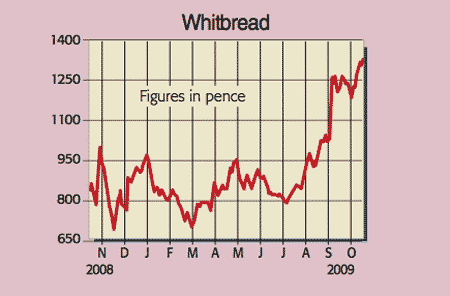Get the latest financial news, insights and expert analysis from our award-winning MoneyWeek team, to help you understand what really matters when it comes to your finances.
You are now subscribed
Your newsletter sign-up was successful
Want to add more newsletters?

Twice daily
MoneyWeek
Get the latest financial news, insights and expert analysis from our award-winning MoneyWeek team, to help you understand what really matters when it comes to your finances.

Four times a week
Look After My Bills
Sign up to our free money-saving newsletter, filled with the latest news and expert advice to help you find the best tips and deals for managing your bills. Start saving today!
One benefit of the credit crunch is that British hotels are much cheaper to stay in. Falling demand means lots of empty beds, leading to a price war between the big operators that should run well into 2010.
Whitbread's Premier Inn (which accounts for 70% of group profits) is the top budget hotel with a 40% market share. Its "summer sizzling break" campaign launched in June, making 250,000 nights available at £29 each. Number-two player Travelodge answered with a £19 tariff, triggering a flood of discounts from other mid-market hotels.
That's great for price-conscious business and leisure travellers, but not for hoteliers. This kamikaze strategy rarely produces a winner; instead everyone's profit margins are crushed. Indeed, Alan Parker, Whitbread's chief executive, is now threatening to quadruple the promotion to a whopping one million nights. Yet all these cut-throat deals seem to have been largely ignored by investors, who have bid Whitbread's shares up by 85% from the March lows.
MoneyWeek
Subscribe to MoneyWeek today and get your first six magazine issues absolutely FREE

Sign up to Money Morning
Don't miss the latest investment and personal finances news, market analysis, plus money-saving tips with our free twice-daily newsletter
Don't miss the latest investment and personal finances news, market analysis, plus money-saving tips with our free twice-daily newsletter
Whitbread (LSE: WTB), rated OUTPERFORM by Credit Suisse

The City seems convinced that corporate visitors will return in their droves in 2010 as GDP rebounds, driving revenue per available room (revPAR) up as occupancy levels improve. But I'm not so sure. Unemployment growth paused for breath with the creation of extra summer jobs as a result of more Britons holidaying in the UK this year.
But this is a temporary respite. With dole queues set to lengthen to three million (9.5% unemployment) by 2011, budgets for discretionary items such as hotel stays will remain tight for the foreseeable future.
The bulls also argue that the rest of Whitbread's divisions (30% of profits), such as its Costa Coffee cafs and its Brewers Fayre restaurants, are doing well against rivals. Fine, but like-for-like sales growth is still nothing amazing at 2.1%.
Whitbread is also increasing capacity, but if a double-dip recession comes in late 2010, this could be the final straw. The City expects 2009 sales and underlying EPS of £1.36bn and 79.8p respectively, rising to £1.42bn and 81.2p in 2010. That puts the shares on p/es of 16.6 and 16.
I'd rate Whitbread on a ten-times 2010 operating profit (Ebita) multiple. After adjusting for the £607m in net debt and the £408m pension deficit (net of tax), you get an intrinsic worth of around 820p. Shareholders should head for the exit.
Recommendation: SELL at £13.00
Paul Hill also writes a weekly share-tipping newsletter, Precision Guided Investments
Get the latest financial news, insights and expert analysis from our award-winning MoneyWeek team, to help you understand what really matters when it comes to your finances.
Paul gained a degree in electrical engineering and went on to qualify as a chartered management accountant. He has extensive corporate finance and investment experience and is a member of the Securities Institute.
Over the past 16 years Paul has held top-level financial management and M&A roles for blue-chip companies such as O2, GKN and Unilever. He is now director of his own capital investment and consultancy firm, PMH Capital Limited.
Paul is an expert at analysing companies in new, fast-growing markets, and is an extremely shrewd stock-picker.
-
 Should you buy an active ETF?
Should you buy an active ETF?ETFs are often mischaracterised as passive products, but they can be a convenient way to add active management to your portfolio
-
 Power up your pension before 5 April – easy ways to save before the tax year end
Power up your pension before 5 April – easy ways to save before the tax year endWith the end of the tax year looming, pension savers currently have a window to review and maximise what’s going into their retirement funds – we look at how